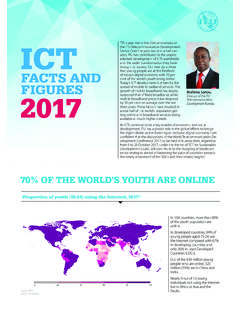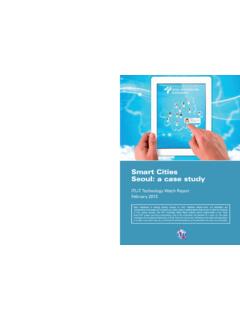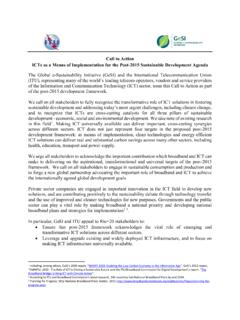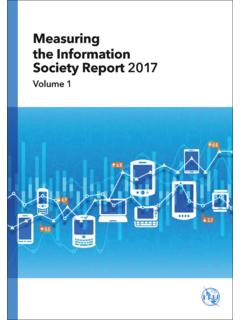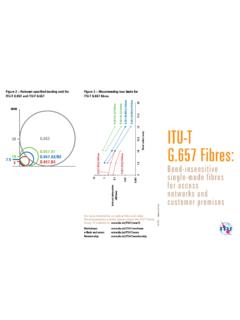Transcription of Ethical issues in Artificial Intelligence in Health care - ITU
1 Ethical issues in Artificial Intelligence in Health , MD, DGOS enior DDG & Scientist G (Retd.), ICMRP resident, FERCI(Forum for Ethics Review Committees in India)What is Artificial Intelligence Definition-- Use of a computer to model intelligent behaviour with minimal human intervention Machines & computer programs are capable of problem solving and learning, like a human brain. Natural Language Processing ( NLP ) and translation, Pattern recognition, Visual perception and Decision making. Machine Learning ( ML )
2 , one of the most exciting areas for Development of computational approaches to automatically make sense of data Advantage of Machine Can retain information Becomes smarter over time Machine is not susceptible to sleep deprivation , distractions, information overload and short-term memory lossGlobal ChallengesA Growing Total World PopulationAn Aging Developed World Population13+ Million Provider ShortfallChronic andPreventable Disease EpidemicGrowth drivers of AI in healthcare Increasing individual healthcare expenses Larger Geriatric population Imbalance between Health workforce and patients Increasing Global Health care expenditure Continuous shortage of nursing and technician staff.
3 The number of vacancies for nurses will be million by 2020 AI is and will help medical practitioners efficiently achieve their tasks with minimal human intervention, a critical factor in meeting increasing patient demand. Innovations in Medical and Biological Engineering 1950s and earlier Artificial Kidney X ray Electrocardiogram Cardiac Pacemaker Cardiopulmonary bypass AntibioticProduction technology Defibrillator 1960s Heart valve replacement Intraocular lens Ultrasound Vascular grafts Blood analysis and processing 1970s Computer assisted tomography Artificial hip and knee replacements Balloon catheter Endoscopy Biological plant food engineering 1980s Magnetic resonance imaging Laser surgery Vascular grafts
4 Recombinant therapeutics Present day Genomic sequencing and microarrays Positron Emission tomography Image guided surgeryNew generations of medical technology products are Combination of different technologies which lead to the crossing of borders between traditional categories of medical products such as medical devices, pharmaceutical products or human tissuesArtificial Intelligence in medicine : The virtual branchThe virtual component is represented by Machine Learning, (also called Deep Learning)-mathematical algorithms that improve learning through experience.
5 Three types of machine learning algorithms: (ability to find patterns) (classification and prediction algorithms based on previous examples) learning (use of sequences of rewards and punishments to form a strategy for operation in a specific problem space) Benefits of Artificial Intelligence AI can definitely assist physicians Clinical decision making -better clinical decisions Replace human judgement in certain functional areas of healthcare (eg, radiology). up-to-date medical information from journals.
6 Textbooks and clinical practices Experienced vsfresh Clinician 24x7 availability of expert Early diagnosis Prediction of outcome of the disease as well as treatment Feedback on treatment Reinforce non pharmacological management Reduce diagnostic and therapeutic errors Increased patient safety and Huge cost savings associated with use of AI AI system extracts useful information from a large patient population Assist making real-time inferences for Health risk alert and Health outcome prediction Learning and self-correcting abilities to improve its accuracy based on Intelligence in medicine: The physical branchIt includes.
7 Physical objects, Medical devices Sophisticated robots for delivery of care (carebots)/ robots for of robots to deliver surgeryUse of robots to monitor effectiveness of treatmentUse of robots to deliver treatment -Robotic surgeryAI ChallengesLarge quantities of data with appropriate patient privacy protectionCurated clean databasesTrust & transparencyCombining data and knowledge driven learningThe last mile: understanding of the (local) clinical contextClinical CyclesInclusionFragmented Healthcare IT infrastructurePotential challenges Development costs Integration issues Ethical issues Reluctance among medical practitioners to adopt AI Fear of replacing humans Data Privacy and security Mobile Health applications and devices that use AI Lack of interoperability between AI solutions Data exchange Need for continuous training by data from clinical studies Incentives for sharing data on the system for further development and
8 Improvement of the system. Nevertheless, All the parties in the healthcare system, the physicians, the pharmaceutical companies and the patients, have greater incentives to compile and exchange information State and federal regulations Rapid and iterative process of software updates commonly used to improve existing products and servicesArtificial Intelligence Enable preventive andprecisionmedicine Improve patient experience, access and outcomes Augment the Intelligence of the clinician, and remove non-value added work Create increasing opportunities for corporate clinical co-creation and innovation Answer global healthcare challenges Create the Perpetual Global Clinical Trial Allow us to know our patients like never before Key takeawaysaiRecent initiatives on Ethics of AI GovtCentre for data ethics and Innovation 2018 Lovelace Institute of Nuffield Foundation AI between Amazon, Apple, DeepMind, Facebook, Google.
9 Microsoft & IBM Global initiative on ethics of Autonomous and Intelligent systems in 2016 5. AsilomarAI principles developed in 2017 6. House of Lords Select committee on AI group on ethics in Science & New technologies in 2018 WHO Consultative meeting on AI & Health care 2019 Ethical and Social IssuesMany Ethical and social issues raised byAI overlap with those raised by data use; automation; the reliance on technologies more broadly; and issues that arise with the use of assistive technologies and telehealth.
10 RELIABILITY AND SAFETY TRANSPARENCY AND ACCOUNTABILITY DATA BIAS, FAIRNESS, AND EQUITY EFFECTS ON PATIENTS TRUST EFFECTS ON HEALTHCARE PROFESSIONALS DATA PRIVACY AND SECURITY MALICIOUS USE OF AI CHALLENGES FOR GOVERNANCE Guidelines for Trustworthy AI issued byEuropean Commission, 2018 . Ethical principles in AI Develop, deploy and use AI systems in a way that adheres to the Ethical principles of: respect for human autonomy, prevention of harm, fairness and explicability. Acknowledge and address the potential tensions between these principles.
